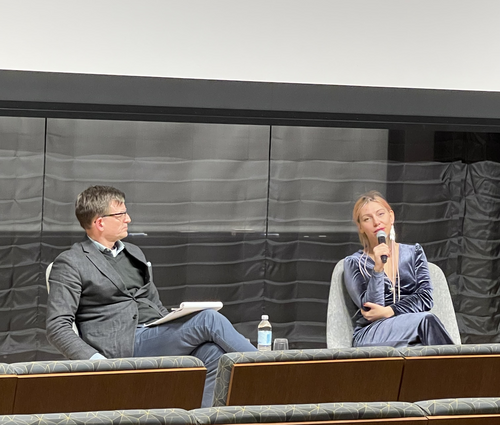
This event, hosted by the Baltic Studies Program at the European Studies Council on February 2, featured a film screening of Burial by Lithuanian artist and filmmaker Emilija Škarnulytė. The film was followed by a discussion between Škarnulytė and Bradley Woodworth, Coordinator of Baltic Studies at Yale University and Professor of History at the University of New Haven.
Škarnulytė’s film explores the decommissioning process of the Ignalina Nuclear Power Plant, which Lithuania agreed to close down in order to be admitted to the European Union. Her film was informed by over 7 years of filming, consulting nuclear power activists in France and New Mexico, and discussions with nuclear scientists. Škarnulytė not only produced the film but made much of the soundtrack herself and participated in some of the shots. She raised several times the figure of the archaeologist from the future, pondering what might be going on in their head when they come across the abandoned power plant in 10,000 years. The film exploited the long half-life of uranium to bind us with the distant past—the Big Bang in fact, with which the film begins—and the distant future, the archaeologist.
In the discussion, Woodworth drew attention to the aesthetic element of the film, which seemed almost as important if not more important than the sociopolitical narrative. Indeed, probing and intimate shots of gleaming uranium ore, and slowly moving scenes across colorful power plant control panels with each button popping out like a piece of candy, make you want to grab it. Evocative parallels between the abandoned power plant and sunken Etruscan cities drew the viewer’s attention to the material, aesthetic elements of nuclear power. The film’s only character—a snake, which Škarnulytė snuck into the power plant—slithered about Ignalina, its sinuousness and impulsiveness contrasting with the carefully constructed, grid-like, patterned design of the plant and the assiduousness, careful execution of Lithuania’s decommissioning efforts. She referred to the snake as “nature taking over,” a phrase that rings ominously after scenes portraying a rendition of Cigeo, a proposed “deep geological disposal facility” for radioactive waste to be built in France in a region where there has not been any geological activity for millions of years.
One walked away with more questions than answers, but this was in fact Škarnulytė’s intent, as she made clear in the Q&A.

